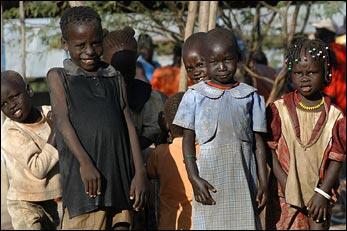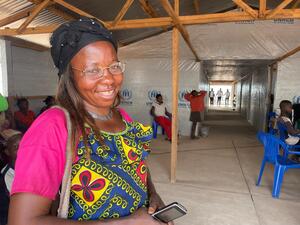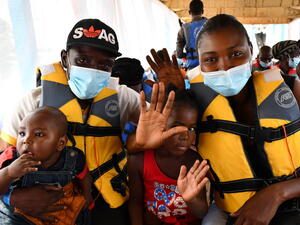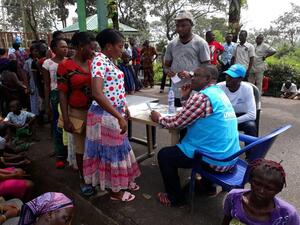Milestone tripartite agreement paves way for organized South Sudan returns
Milestone tripartite agreement paves way for organized South Sudan returns

These Sudanese returnees on the outskirts of Bor, in the eastern corridor of south Sudan, came back spontaneously from Kakuma camp in Kenya.
NAIROBI, Kenya, Jan. 12 (UNHCR) - In an important milestone, the UN refugee agency on Thursday signed the first of seven expected tripartite agreements that will clear the way for up to 70,000 refugees to return to South Sudan in the first half of this year.
The agreement was signed in the Kenyan capital today between the governments of Sudan, Kenya and UNHCR - exactly one year and three days after the Comprehensive Peace Agreement (CPA) that ended 21 years of north-south civil war in Sudan was also signed in Nairobi.
"It's very symbolic and very appropriate that this first tripartite for South Sudan should be signed in Kenya because Kenya played such a crucial role in bringing peace to South Sudan," said Jean-Marie Fakhouri, UNHCR's Director of Operations for the Sudan Situation.
"This gives the message to refugee communities in other countries that one year after the CPA, time has come to seriously think about return," he added.
The UN refugee agency plans to help some 70,000 refugees (Including up to 10,000 from Kenya alone) go back to South Sudan from their exile in neighbouring countries before the start of the rainy season in May or June. Fakhouri said more may be able to go home during the second dry season towards the end of the year.
"Now we are moving to the most vital phase of what we have been preparing for since the end of 2003," said George Okoth-Obbo, UNHCR's Representative in Kenya.
UNHCR's first steps in South Sudan were projects - such as drilling wells, building schools and repairing health centres - to help communities better welcome returnees. There are some 550,000 South Sudanese refugees in neighbouring countries, and at least five million more Sudanese displaced within their own country.
In mid-December, 2005, in an initial repatriation movement, UNHCR sent a small first group of 131 refugees back to South Sudan from Kenya. It is estimated that last year some 70,000 to 80,000 refugees went home to South Sudan on their own.
Thursday's tripartite agreement sets out the roles and obligations of each of the three partners in helping South Sudanese refugees go home from Kenya, primarily from Kakuma Camp in north-western Kenya, home to some 70,000 Sudanese refugees.
All sides agreed, for example, that any returns should be voluntary, and Sudan pledged to ensure that refugees can return in safety and dignity. Kenya pledged to continue to safeguard the rights of refugees who decide to stay in Kenya for now.
This agreement is to be followed by tripartite agreements between Sudan, UNHCR and other countries of asylum. Fakhouri said the agreement with the Democratic Republic of the Congo should be signed by the end of this month, to be followed by an agreement with the Central African Republic. He said agreements are also being negotiated with Uganda and Ethiopia, where some 14,000 Sudanese refugees, out of 73,000 in five camps, have asked UNHCR to take them home immediately.
These agreements should also send a signal to international donors about the need for more funding for repatriation, Fakhouri said. In 2005, UNHCR's Sudan operations received only $42 million out of the $76 million needed. For 2006, the minimum requirement for funding for the repatriation is $63 million.
At a press conference following signing of the tripartite agreement, Sudanese journalists and Sudanese refugees said schools and other services should be provided in South Sudan before refugees go home. But both Fakhouri and Sudan's Interior Minister, Brigadier Aleu Ayieny Aleu, argued that it if the refugees go home to rebuild their own country, services will follow.
After refugees from the Bor area in Jongley State told UNHCR they wanted to go home, UNHCR sent "four people with tents" to establish the first international presence there, Fakhouri said. This was the magnet, he said, that drew other UN agencies and non-governmental organizations to Bor to work together with returnees to spark development.

Sudanese refugee children in Kakuma camp, Kenya. These children were born in the camp, and know nothing of their parents' and grandparents' country.
"Yes, it's true, it's going to take years before South Sudan is going to reach the level of services that refugees have had in camps in neighbouring countries," Fakhouri said. "But it's going to happen much faster and in a more peaceful way if refugees themselves contribute by returning. The real builders will be returnees."
Brig. Aleu was even more forceful. "We are not forcing anyone to go back home, but you have a duty to go back home," he told Sudanese refugees. "You need to go and help us in developing these things" - the schools and health facilities they want.
By Kitty McKinsey in Nairobi, Kenya








